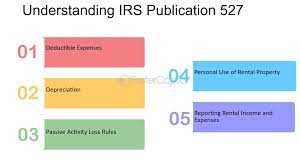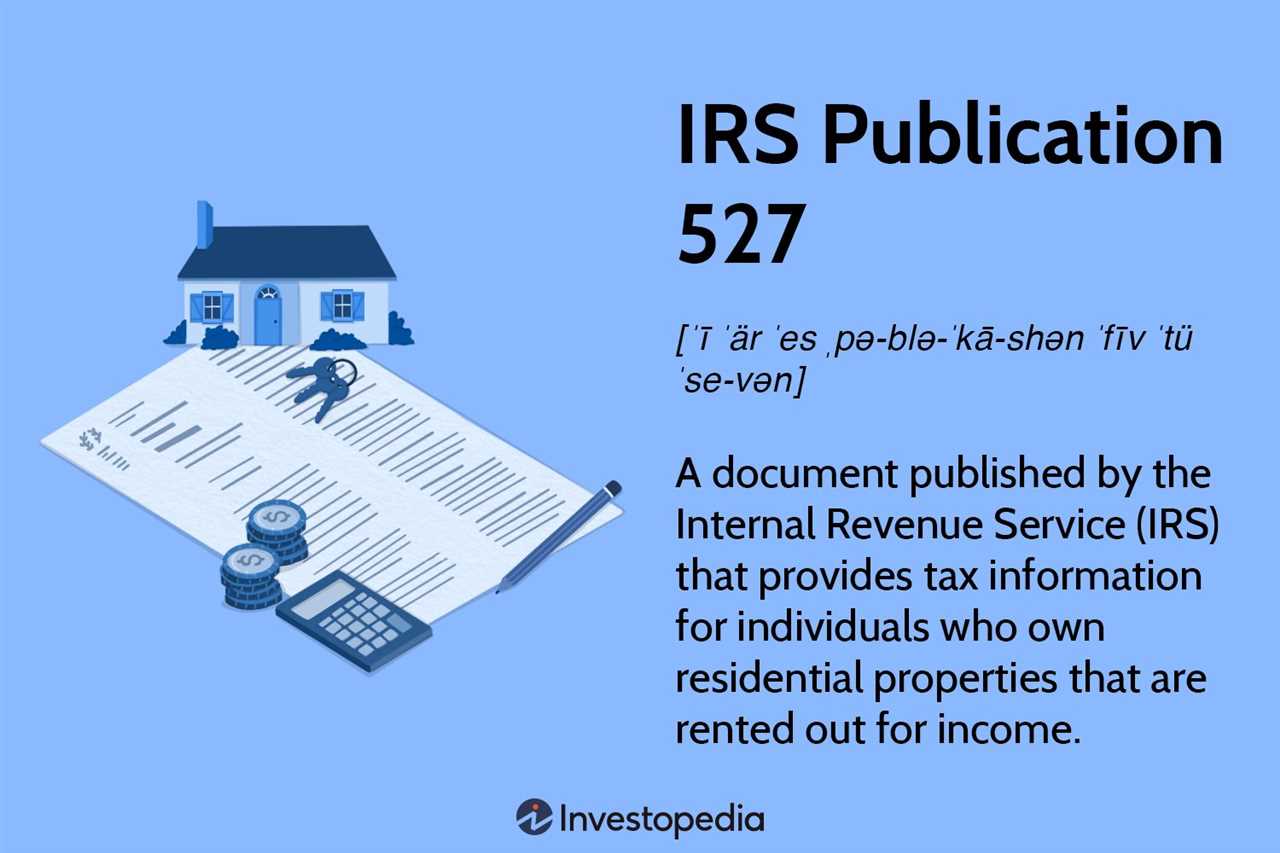What is IRS Publication 527?
IRS Publication 527 is a comprehensive guide provided by the Internal Revenue Service (IRS) that offers valuable information and guidance on tax rules and regulations related to residential rental property. It is specifically designed for individuals who own or are considering investing in real estate properties for rental purposes.
This publication serves as a valuable resource for real estate investors as it provides detailed explanations and examples of how to report rental income and expenses on tax returns. It covers various topics such as rental income, rental expenses, depreciation, and passive activity limitations.
Who is it for?
IRS Publication 527 is primarily intended for individuals who own residential rental properties, including landlords, property managers, and real estate investors. It is also beneficial for individuals who are considering venturing into real estate investing and want to understand the tax implications and requirements associated with rental properties.
What does it cover?
The publication covers a wide range of topics related to residential rental properties, including:
| Rental income | Expenses | Depreciation |
| Passive activity limitations | Personal use of rental property | How to report rental income and expenses |
It provides detailed instructions on how to calculate and report rental income, what expenses can be deducted, and how to handle depreciation of rental properties. The publication also explains the rules and limitations for claiming losses from rental activities and how to determine if a rental property is considered a passive activity.
Why is it important?

Additionally, IRS Publication 527 provides valuable information on how to handle personal use of rental properties, which can have tax implications. It helps investors navigate the complexities of tax rules and make informed decisions regarding their rental properties.
Additionally, IRS Publication 527 provides guidance on how to properly report rental income and expenses on tax returns. This is crucial for investors to ensure compliance with the tax laws and avoid any potential penalties or audits from the IRS.
Furthermore, IRS Publication 527 helps investors stay informed about any changes or updates to the tax rules that may impact their real estate activities. The publication is regularly updated to reflect the latest tax laws and regulations, ensuring that investors have access to accurate and up-to-date information.
In summary, IRS Publication 527 plays a vital role in real estate investing by providing comprehensive guidance on tax rules and regulations. It helps investors understand their obligations, maximize their tax benefits, and stay compliant with the tax laws. It is an essential resource for anyone involved in real estate investing and should be consulted regularly to ensure proper tax planning and reporting.
How to Utilize IRS Publication 527 for Real Estate Investing
IRS Publication 527 is a valuable resource for real estate investors looking to understand and navigate the tax implications of their investments. Here are some key steps to effectively utilize this publication:
2. Determine Your Tax Filing Status: Before diving into the details, determine your tax filing status. This will help you identify which sections of the publication are most relevant to your situation.
3. Identify Deductible Expenses: IRS Publication 527 provides a detailed list of deductible expenses that real estate investors can claim on their tax returns. Take the time to identify which expenses are applicable to your investments, such as mortgage interest, property taxes, repairs, and maintenance costs.
4. Understand Depreciation: Depreciation is a key concept in real estate investing, and IRS Publication 527 provides guidance on how to calculate and claim depreciation deductions. Make sure you understand the rules and requirements for depreciating your rental property or properties.
6. Seek Professional Advice: While IRS Publication 527 is a valuable resource, it’s always a good idea to consult with a tax professional who specializes in real estate investing. They can provide personalized advice based on your specific circumstances and help you maximize your tax benefits.
By utilizing IRS Publication 527 effectively, real estate investors can navigate the complex world of tax regulations and make informed decisions that optimize their financial outcomes.
Key Information and Tips for Real Estate Investors
1. Know the Basics
2. Keep Detailed Records
One of the most important tips for real estate investors is to maintain accurate and detailed records of all income and expenses related to their properties. This includes rental income, repairs and maintenance costs, property taxes, and mortgage interest. Keeping organized records will not only make it easier to complete your tax returns but also provide documentation in case of an audit.
3. Understand Depreciation
4. Take Advantage of Deductions
5. Stay Updated on Tax Laws

6. Seek Professional Advice

Resources and Additional Information on IRS Publication 527
IRS Publication 527 is a valuable resource for real estate investors, providing comprehensive information on the tax rules and regulations that apply to rental income and expenses. However, it is important to note that the publication is not a substitute for professional tax advice. Here are some additional resources and information that can help real estate investors make the most of IRS Publication 527:
| Resource | Description |
|---|---|
| IRS Website | The official website of the Internal Revenue Service (IRS) provides access to IRS Publication 527, as well as other relevant publications and forms. Real estate investors can visit the website to download the publication and stay updated on any changes or updates. |
| Tax Professionals | Consulting with a tax professional who specializes in real estate can provide personalized advice and guidance on how to navigate the tax rules and regulations outlined in IRS Publication 527. These professionals can help investors maximize their deductions, minimize their tax liability, and ensure compliance with the IRS. |
| Real Estate Investment Associations | Joining a local real estate investment association can provide access to a network of experienced investors who can share their knowledge and insights on using IRS Publication 527 effectively. These associations often hold seminars, workshops, and networking events where investors can learn from experts in the field. |
| Online Forums and Communities | Participating in online forums and communities dedicated to real estate investing can be a valuable source of information and support. Investors can ask questions, share experiences, and learn from others who have successfully utilized IRS Publication 527 in their own real estate ventures. |
| Books and Publications | There are numerous books and publications available that delve into the intricacies of real estate investing and tax strategies. These resources can provide in-depth explanations and examples of how to apply the concepts outlined in IRS Publication 527 to specific investment scenarios. |

Emily Bibb simplifies finance through bestselling books and articles, bridging complex concepts for everyday understanding. Engaging audiences via social media, she shares insights for financial success. Active in seminars and philanthropy, Bibb aims to create a more financially informed society, driven by her passion for empowering others.
